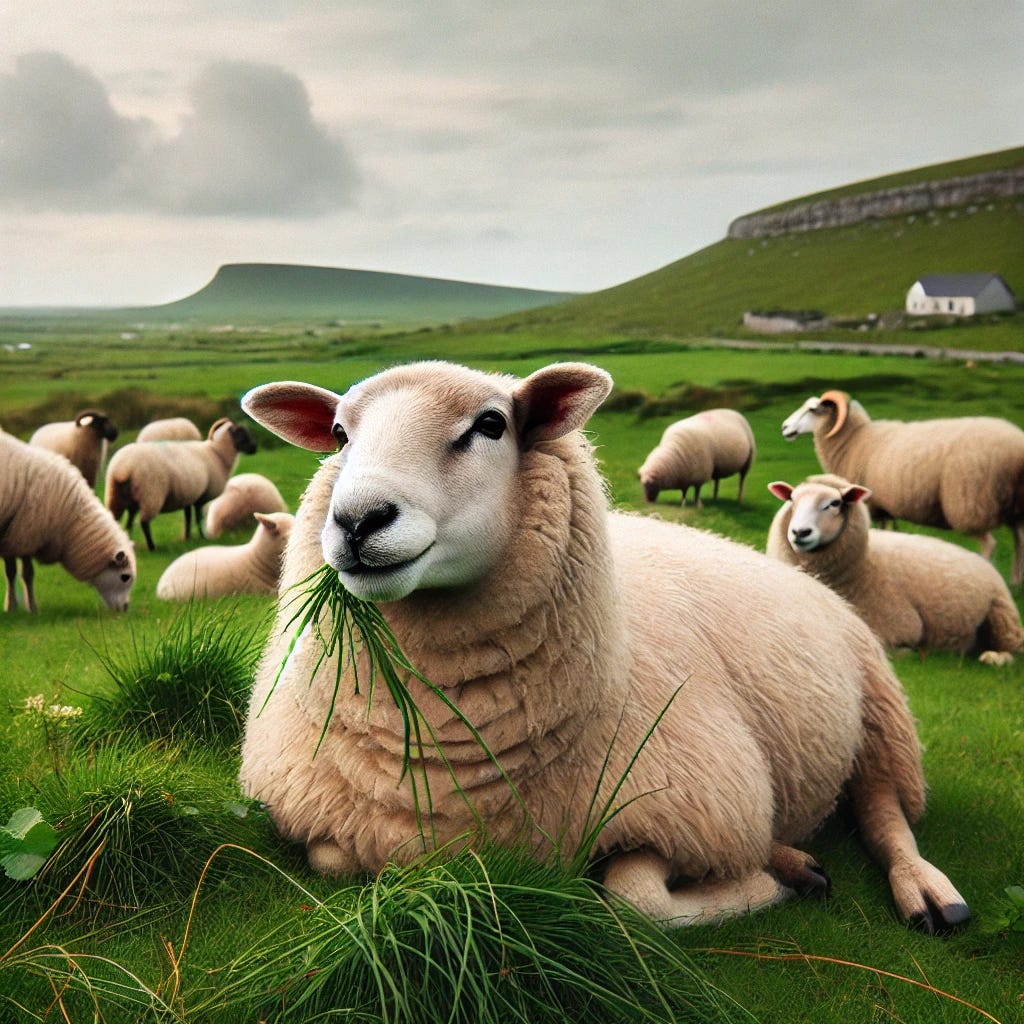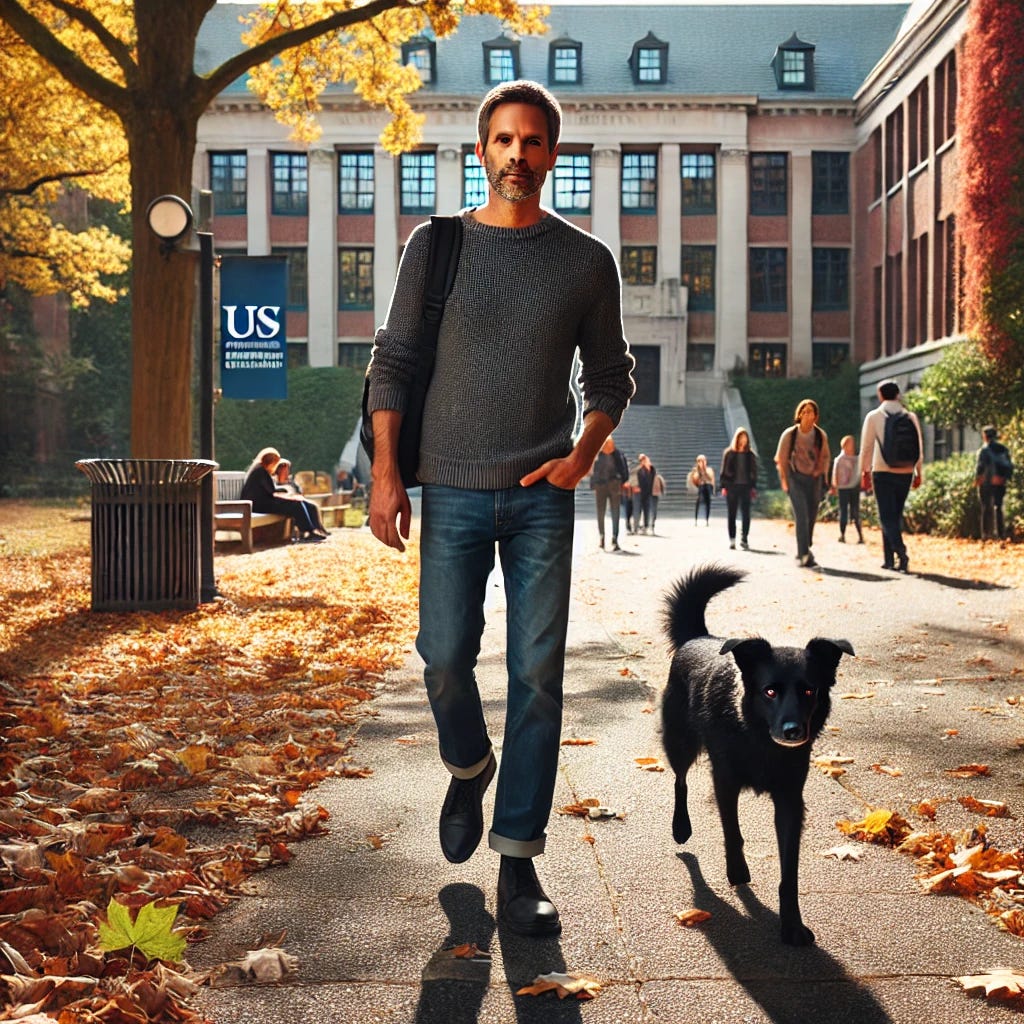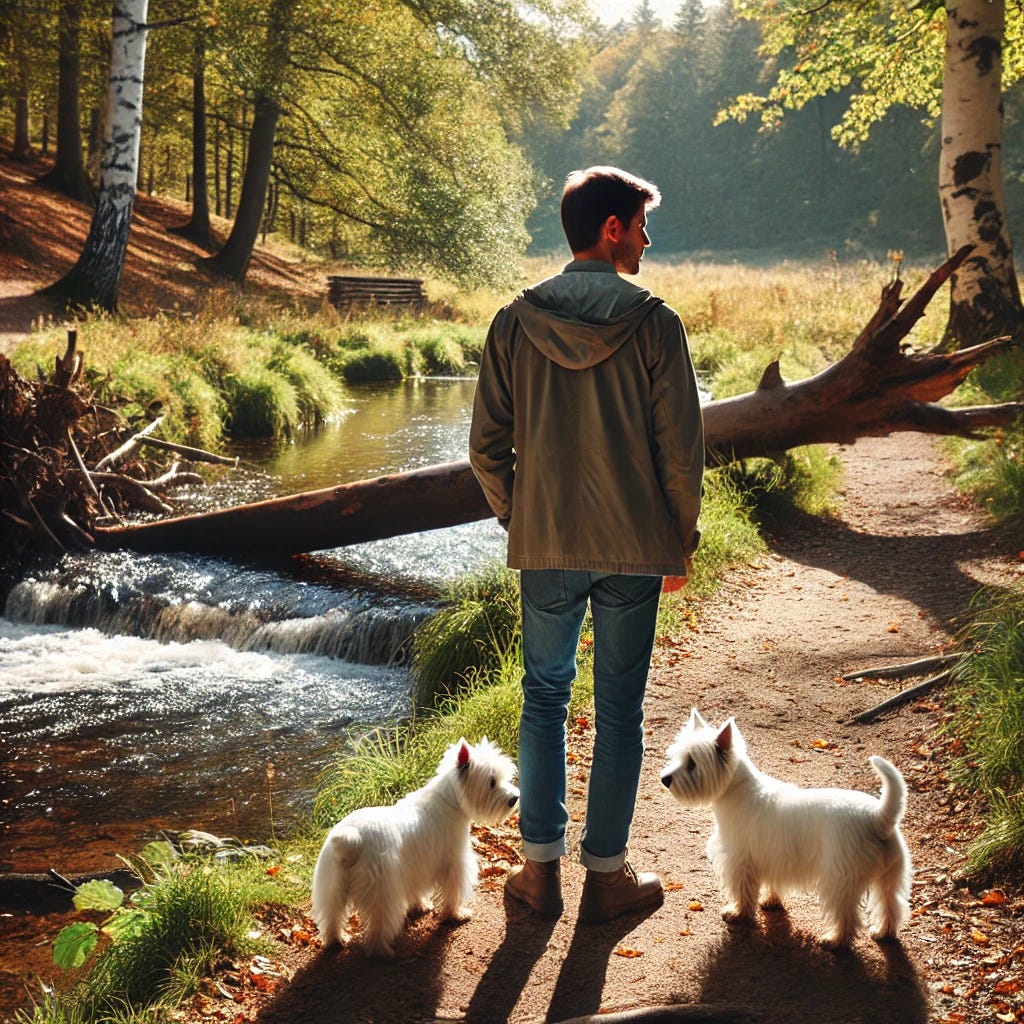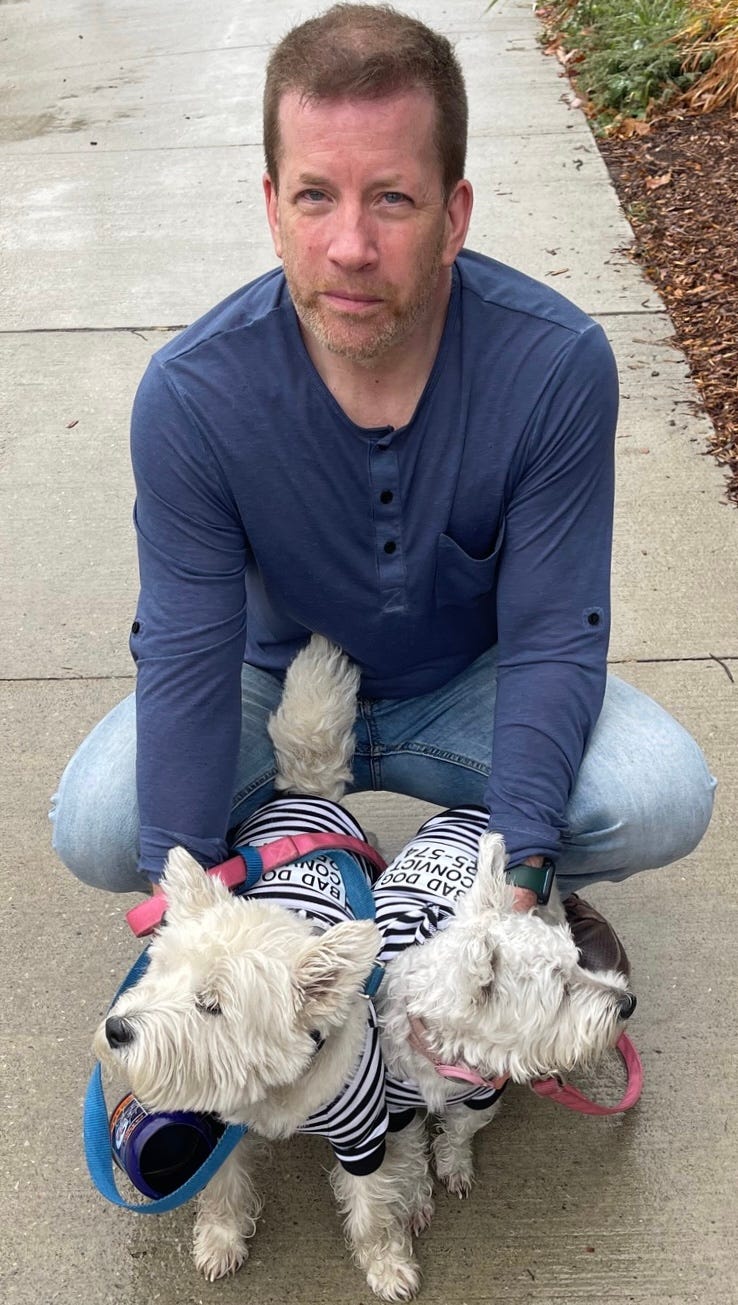If you believe in the importance of free speech, subscribe to support uncensored, fearless writing—the more people who pay, the more time I can devote to this. Free speech matters. I am a university professor suspended because of a free speech issue, so I am not speaking from the bleachers. The button below takes you to that story if you like.
Please subscribe and get at least three pieces /essays per week with open comments. It’s $5 per month and less than $USD 4. I know everyone says hey, it’s just a cup of coffee (with me, not per day but just one per month), but if you’re like me, you go, “Hey, I only want so many cups of coffee!” I get it. I don’t subscribe to many here because I can’t afford it.
But I only ask that when you choose your coffee, please choose mine. Cheers.
____________________________________________________________________
I stepped out of the house with the dogs and was surprised by the warmth of the Toronto mid-October sun. A surge of happiness and gratitude went through me; had the unexpected warmth helped some neural signal in my brain go in the right direction, or was it random? Did anything I did play a part in creating this feeling?
The sensation, though lifting my immediate step, was brief. Was this momentary euphoria a permanent state of existence for others? Was its onset affected by anything I had thought? Or was it simply a random and meaningless visceral lift?
Was my thankfulness for the enthusiasm of my terriers the precursor for this brief lift of happiness that had met me at the end of the driveway?
All this sounds painfully over-analytical, but while struggling with depression, I was not damned to struggle with poor self-awareness. Indeed, often, I could not maintain a grip on gratitude without slipping back into melancholy. There were better and worse months; I had passed the standard benchmarks of success, good education, marriage, children, and career, with enough status to fulfil the front-end obligations of any new conversation. Of course, I had never lived in another’s mind or body, But I was convinced I had spent more time than most living in a state of what Thoreau famously called quiet desperation.
“The mass of men lead lives of quiet desperation. What is called resignation is confirmed desperation.” (1854, Walden)
The phrase spoke of feeling forced to put on a facade of normalcy or acceptance while feeling unfulfilled or trapped, but to me, the phrase ‘existential angst’ seemed trite. I did not willfully wear a mask; melancholy was not based on circumstance. The melancholy was just an unwanted guest who didn’t want to leave, like one of those party guests that you must pull out the vacuum before they get the message that the party is over.
Attempts to convince unwanted guests to leave, including chumming the emotional waters with prospects of future gains, never worked. It was half-hearted salesmanship - I was both the seller and the buyer - and I was putting the future in the shop window. But change always seemed larger from a distance, the opposite of how sight works. It shrank as you drew near.
But on this day, I was determined to use my driveway experience as a platform to examine my assumptions.
Was gratitude an emotion or a perspective, a framing, a condition of the mind or the heart, a healthy chemical and electric mix in the brain, or a neural pathway missing an offramp? I always assumed chasing feelings was a fool’s errand, but perhaps I had dismissed it too easily. Perhaps I controlled more than I supposed.
Knowing that we are—I am—a creation of my discipline meant that change was possible; it was a matter of changing habits. Perhaps I am late -I have just turned sixty, and almost half of my best childhood friends are gone. I didn’t think a number could be so intrusive, but sixty is much friendlier with mortality than fifty-nine.
I forced myself to think about it - what if I introduced my 30-year-old self to my present self? I think I would have been pleased, not ecstatic, but content.
Contentment was a good place to start.
Contentment is a meatier dish than gratitude; it is more substantial, filling, and less likely to have me open the fridge in the evening.
Contentment takes ambition, folds it neatly, takes it off the top of the pile, and carefully puts it underneath, not deliberately hidden but no longer treated like the favourite jeans that go from the laundry to the top of the closet pile.
I remember my father. He was not saddled with ambition. When meeting a stranger, he did not tell them his job title. He did not even have to fight off this compulsion; it never occurred to him.
Furthermore, luxury goods and brand names seemed foolish to him. He did not need to attend a seminar that told him to renounce this and that; such acquisitions never troubled him.
At a material level, his contentment always impressed me. For without contentment, there can be no gratitude. Gratitude reframes perspective; if you read Keats ‘To Autumn’, you can hear reverence and gratitude.
And full-grown lambs loud bleat from hilly bourn;
Hedge crickets sing, and now with treble soft
The red-breast whistles from a garden croft;
And gathering swallows twitter in the skies.
(1819, Keats)
I smile as I remember travelling to my Irish relative's farm and seeing the lambs on the hillside, their woolly jaws munching side to side, their companions two steps away lying down, their front hoofs tucked under their chests.
Cognitive behaviour therapy (CBT) touts the value of such thoughts, and scripture urges their pursuit. But it is odd for someone feeling the weight of depression to jump upon gratitude as the fix. Is not the motivation all wrong? Can you decide to pursue gratitude because you want to mitigate depression? Doesn’t gratitude have to grow alone? Can it share a pot with selfish motivation?
I can start by acknowledging goodness, the solid fill that supports contentment. Acknowledgement does not chase feelings. Indeed, it cannot move; it just supports the weight of what you build on top of it.
Old Testament gratitude was communal, and perhaps this is a weakness of the age; it is becoming harder to make friends, digital indulgences are solitary, our living room now is used less than mine growing up, so many nights coming home everyone is in their rooms, the doors are closed. But my dogs clump hurriedly down the stairs, the claws slipping on the hardwood as they hurdle toward me.
Even the dogs do not want to be alone.
Discipline says to give thanks in all circumstances, and CBT says to make lists. Neither is bent on chasing feelings, waiting for them, or hoping for such feelings to descend into the heart.
It is difficult to ‘not do something’ - it is better to focus forward on doing something. I do better when I fill the space, state what is good, and push out the darkness.
Experts, of course, have a name for it: cognitive reframing. As frames force the eye to break and pause to see the painting on the wall, so does it in my mind; the walls do not hang paintings on their own; I must place them there.
In my mind's eye, I force myself to ask what sight, recent memory, or feeling I can recapture and hang on the wall.
Just the other night - my dogs, two glow collars, red and blinking green, ran chasing a yellow tennis ball in the darkness of the park’s fenced-in space.
As I threw the ball down a slope, I could see the patchy grass was worn away; the dogs chased each other like it was their first tennis ball.
Two nights ago, our family attended a Halloween fright event on a large abandoned lot, three acres on the city's edge.
The line was barely moving. Teenagers, well-costumed in makeup and masks, tormented and silently flirted with pretty teenage girls in line who screamed without real fear; their eyes were bright.
The slow line tested my patience, but it eventually began to move, and my daughter clutched my arm as we walked through the Halloween park. The air was still full of false screams and laughter, and the dry ice machine let us walk without seeing our feet. It was now just the four of us, as my mother-in-law had left for the car.
You cannot walk too quickly through scream parks; doing one thing without hurraying was pleasant.
When the final scare exhibit was passed, the path opened into a dirt road and a dark parking lot. My daughter patched things up quickly with her mother. The tiff from earlier evening was forgotten, and they left together. I let my son drive us home in the new car, and as we turned onto our street, I recognised my daughter’s car in front of us.
The dogs were jubilant to have us home and could not contain themselves. The moment the door was opened, they ran onto the porch.
Experts say that gratitude fosters resilience. People who express gratitude in challenging times recover more quickly from adversity. Gratitude does not erase; it tells us where to look with our minds' eyes.
My instinct, though, is to look down, sometimes gnawed by grief. But are not instincts disciplines that we allow?
I remembered the day before in the park, how the Canadian geese congregated near the dog park at night, their contented cries of ka-lonk filling the air.
But I often find myself loosening my grip on the disciplines of gratitude. Someone has tossed a rock through a synagogue I know, the head gasket on the newish van is blown, and my fingers sometimes grow numb.
There is, though, good around me. It is not a question of finding it; I must turn toward it and speak of it. Lately, when I am alone, I read from those lists of good things; again, it fills the space, protects me, and stands straight-legged.
Still, the black dog wants to follow. I am hearted that someone as strong as Winston Churchill spoke of it. His black dog of depression came out of old English superstitions that if a black dog appeared, it foretold harm, and they believed it was an oppressive presence. Though not rooted in superstition, our modern black dog also oppresses; it darkens the air and confuses the mind’s eye.
Sometimes, the firm ground of contentment leads us along a narrow path that runs through high grass. Is there a better path out there? No, the side of the path is pockmarked with holes the size of your heel. It is hard to see where you walk, and I would do better to follow the firm ground of the pathway.
I will walk the dogs this afternoon as soon as the rain stops. Now, they sleep deeply, their black noses on the leather couch, but when I say, ‘Walk!’ their white triangle ears perk up.
They follow me to the door, spinning in exuberance, eager for the chance to go with me into the forest near our house. Here, rabbits cross our path, and squirrels scamper up the trunk of a Maple tree, their small brown paws alternating in staccato efficiency.
My dogs try to chase them, but we press on; they are on a leach and are soon content. We pass the brook that narrows noisily as it diverts around a tree that has fallen in the water.
All is well.
Please subscribe and get at least three pieces /essays per week with open comments. It’s $5 per month and less than $USD 4. I know everyone says hey, it’s just a cup of coffee (with me, not per day but just one per month), but if you’re like me, you go, “Hey, I only want so many cups of coffee!” I get it. I don’t subscribe to many here because I can’t afford it.
But I only ask that when you choose your coffee, please choose mine. Cheers.
____________________________________________________________________










No fun when the black dog visits. There is a lot to be depressed about these days, especially if you spend much time on devices or following news broadcasts. Gratitude may not lift the cloud, but it reminds me that the cloud will eventually pass and the sun return. My mom always said to turn on all the lights indoors on gloomy days. Having weather dependent moods, I follow that advice. I have only needed medication one time, 24 years ago, but it helped. What I choose to read matters. My ‘blue blanket’ since October 7th has been Regency romances, of all things! In the middle of the night, I turn to books about trees or to poetry. The escape from bleakness may be temporary, but even temporary respite is healing. Exercise is great. Dogs are great. Family can be a comfort. Wishing you occasional joy into the mix.
Thank you